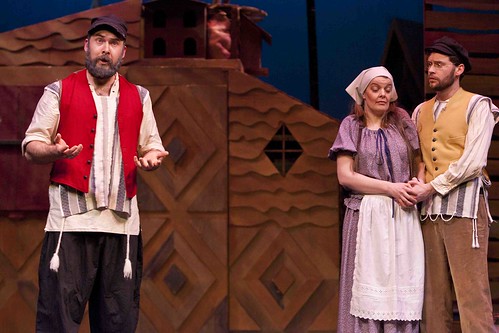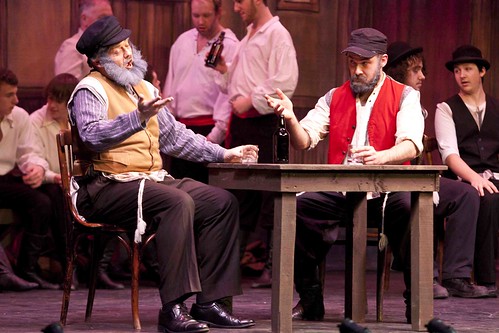Æ Musical Review – Fiddler on the Roof
★★★★☆
King’s Theatre: ends Sat 19 Feb 2011
There is plenty of tradition and lots of great singing in Southern Light Opera’s robust production of Fiddler on the Roof. It is a show which not only hits the marks bang on but which makes room for a big, brave ending.
The first big mark for any production of Fiddler on the Roof is the casting of Tevye, the role created on stage and screen by Topol. He is the milkman in Russian village of Anatevka “blessed” with five daughters and all the traditions of Jewish life in that time, with its strict demarkation between the sexes and matchmaking for any betrothals.

Lech Boron as Tevye, Julie Howie as Tzeitel and Alan Gow as Motel. Photo © Scott Parker Photography.
Lech Boron is a superb find for the company. He makes the role his own and is excellent from beginning to end. On the singing side he has a powerful voice which can sustain the big notes, hit the high notes and maintain his Russian accent throughout.
He creates the impoverished, put-upon papa well, too: always ready with a line from the Bible and happy to break off from the action and remonstrate with his God. Boron really develops the character through the show as he is confronted by, and comes to terms with, a world that is in revolution – both politically and domestically.
The key changes in his domestic life are in Tevye’s eldest three daughters: Tzeitel (Julie Howie), Hodel (Elaine Graham) and Chava (Christine Kirkaldie). Instead of obeying tradition, the matchmaker Yente (Dorothy Johnstone) and their beloved papa, they marry for love.
Under Andy Johnston’s direction this is very much a production that speaks about change and how it is confronted by the little people. The naked truth of the political situation in pre-revolutionary, Tsarist Russia is always in the background, but it does not smoulder under the plot development as it might do in a more subtle production.
Instead there are big production numbers, with choreographer Rhian Reynolds making strong use of the large cast. It is not overly complicated on the main, but certainly reflects the development of the plot, particularly in her deployment of male and female chorus members in the ensemble routines.

Gary Graty as Lazar Wolf and Lech Boron as Tevye discuss Tzeitel’s future happiness. Photo © Scott Parker Photography.
Musically, this is excellent too. A few wayward notes from the pit notwithstanding. Particularly well received is young Donald Taylor who plays the eponymous Fiddler. It’s great to see and hear the famous tunes ringing out from the stage with such resonant tone. It quite shames those professional touring companies that plonk a miming chorus member onto the roof.
Playing against Boron, Laura Jordan Reed is well cast as his wife, Golde. She might not have as much focus on her, but there is a real understanding of how the role works and her singing voice is equally as impressive as Boron’s when it needs to be. Their Do You Love Me? duet is particularly strong, largely because of the reconciliation they make it represent: between their own feelings and those they have had inflicted on them in the name of tradition.
Johnston and Reynolds allow themselves rather more space for invention in The Dream. Having promised Tzeitel in marriage to the old but rich butcher Lazar Wolf (Gary Gray), Tevye has been persuaded to let her marry the poor young tailor Motel (Alan Gow). The dream sequence is Tevye’s trick to get Golde to agree to the change, by calling down all her superstitions to their matrimonial bed. It is superbly staged and performed, working both as a big entertaining number and as a demonstration of the power of tradition itself.
If the big marks are all made cleanly, it must be said that not every footfall is as tight as it might be on the way there. Not all the smaller characters have voices as suitable to solo performance as they could be – and are somewhat overshadowed by the excellence of the leads. Nor are their accents all as compellingly of a Russian extraction.
Then there is the nagging detail of the set. Hired from The Border Studio it works very well – with all the requisite cart, house (complete with roof for the fiddler to appear on) and so on. Disconcertingly, it also seems to have been originally made for a theatre with a slightly smaller proscenium arch than the King’s – leaving gaps through which cast members are distractingly visible.
That said, there is no distraction from the performances themselves, as the production builds to an ending which is all the more powerful for leaving its audience silenced.
Run ends Saturday 19 February
SLO Website
King’s Website
ENDS

















